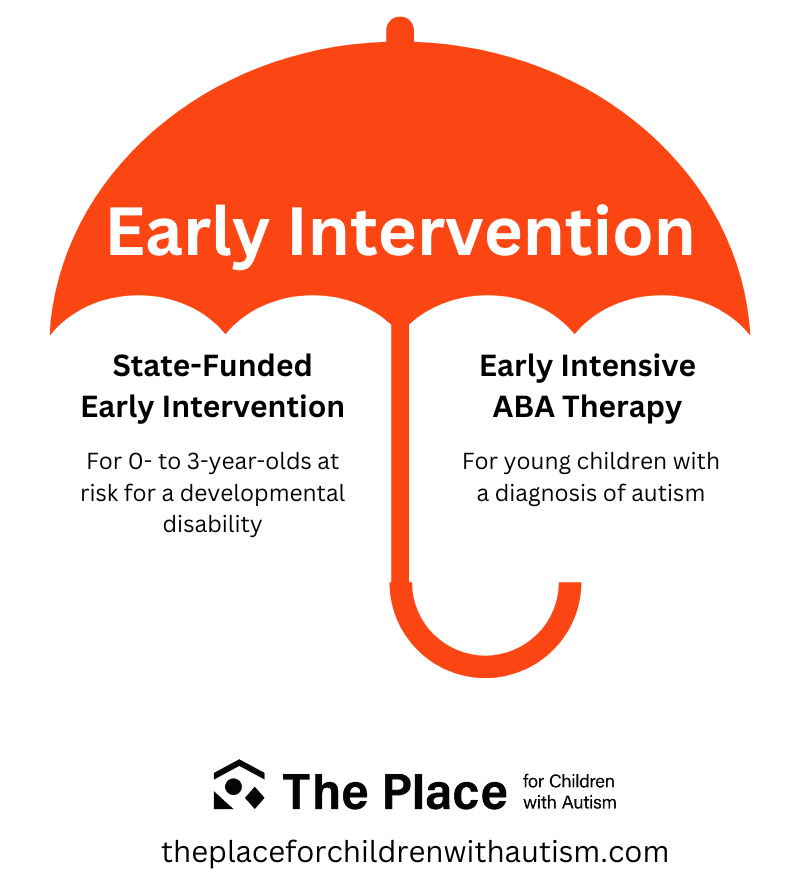What is Early Intervention?
Early intervention (EI) is an umbrella term which refers to the services and support available to babies and young children with developmental delays and disabilities. “Early intervention” may refer to state-funded programs as well as intensive ABA therapy.

State-Funded Early Intervention Services
Every U.S. state or territory has a publicly funded early intervention program to provide free or reduced-cost services for eligible children. Check your state’s early intervention program for more information.
Who Qualifies for State-Funded Early Intervention Services
Your child’s pediatrician may connect you with your state’s early intervention program, or you may reach out yourself. You do not need a doctor’s referral to contact your state’s early intervention program.
How to Enroll Your Child in State-Funded Early Intervention Services
If your child is under the age of 3, call the relevant program for your state and ask for a free evaluation to find out if your child qualifies for early intervention services. You do not need to wait for a doctor’s referral or diagnosis to make this call, but it is a good idea to seek a diagnostic evaluation in addition to early intervention.
If you are located in Illinois, you can find an early intervention specialist through the Illinois Department of Human Services website.
What is Included in State-Funded Early Intervention Services
Early intervention services may vary by location. In Illinois, where The Place for Children with Autism is located, state-funded early intervention typically includes:
- 1 hour / week of Speech Therapy
- 1 hour / week of Occupational Therapy
- 1 hour / week of Developmental therapy
- Parent coaching / collaboration
Applied Behavior Analysis or ABA Therapy
Applied behavior analysis, also known as ABA or ABA therapy, is a research-based treatment that has been shown to be effective for individuals with autism and related disorders. ABA is the gold standard of treatment once a child is diagnosed with autism. It is endorsed by the CDC and US Surgeon General as being the most effective treatment for children with autism.
The earlier you start a child in ABA therapy, the better the outcomes. Therefore, many ABA providers, including The Place for Children with Autism, focus on Early Intervention ABA Therapy. That is, ABA therapy which starts at a very young age (i.e., under the age of 6).
ABA Therapy vs. State-Funded Early Intervention
State-funded early intervention is a valuable resource while seeking an autism diagnosis and ABA provider. It is not a replacement for intensive ABA therapy.
ABA therapy is more comprehensive than state-funded early intervention in the following ways:
- ABA targets a wide variety of skills to increase, such as communication, social skills, independent living skills (e.g. toilet training, feeding, dressing), and school readiness skills.
- ABA involves parent training.
- Where state-funded early intervention is typically only one hour per week, ABA therapy can range from roughly 10 to 40 hours per week depending on the severity of autism symptoms.
- ABA therapy is delivered by trained therapists and overseen by master’s level Board Certified Behavior Analysts (BCBAs)
- ABA therapy is extremely research-based, and treatment decisions are based on data. Data will be taken daily on a variety of your child’s skills to ensure treatment is effective.
- Although ABA therapy is most effective for children 0 – 5 years old, ABA has been shown to be effective from birth through adulthood.
See Also:
Treatment Options for Autism
Frequently Asked Questions
Is a medical diagnosis of a disability required for early intervention or ABA therapy?
For state-funded early intervention services, a medical diagnosis is not required since services are provided to those at risk. For ABA therapy, a medical diagnosis is required to access therapy and in order for insurance to cover therapy. You can reach out to an ABA provider when you begin to suspect autism and they will likely put you in touch with a provider to conduct the autism evaluation.
At The Place for Children with Autism, the outreach team will connect parents to a list of diagnostic providers with short waitlists in order to prevent delays in starting therapy.
Which is more effective, state-funded early intervention or ABA Therapy?
ABA therapy has been identified as the most effective therapy for children with autism. If you suspect your child has autism, the best outcomes will be produced by an early diagnosis and early ABA therapy.
Can my child be enrolled in both ABA therapy and state-funded early intervention?
YES- ABA therapy and state-funded early intervention programs are two different types of therapies with different primary focuses. Your child can be enrolled in both services. Early intervention providers and ABA providers will work closely together to best support your family.
We Change Lives Every Day
Interested in our services and inquiring about placement for your child?
We are now enrolling ages 2-6. Reach out today!